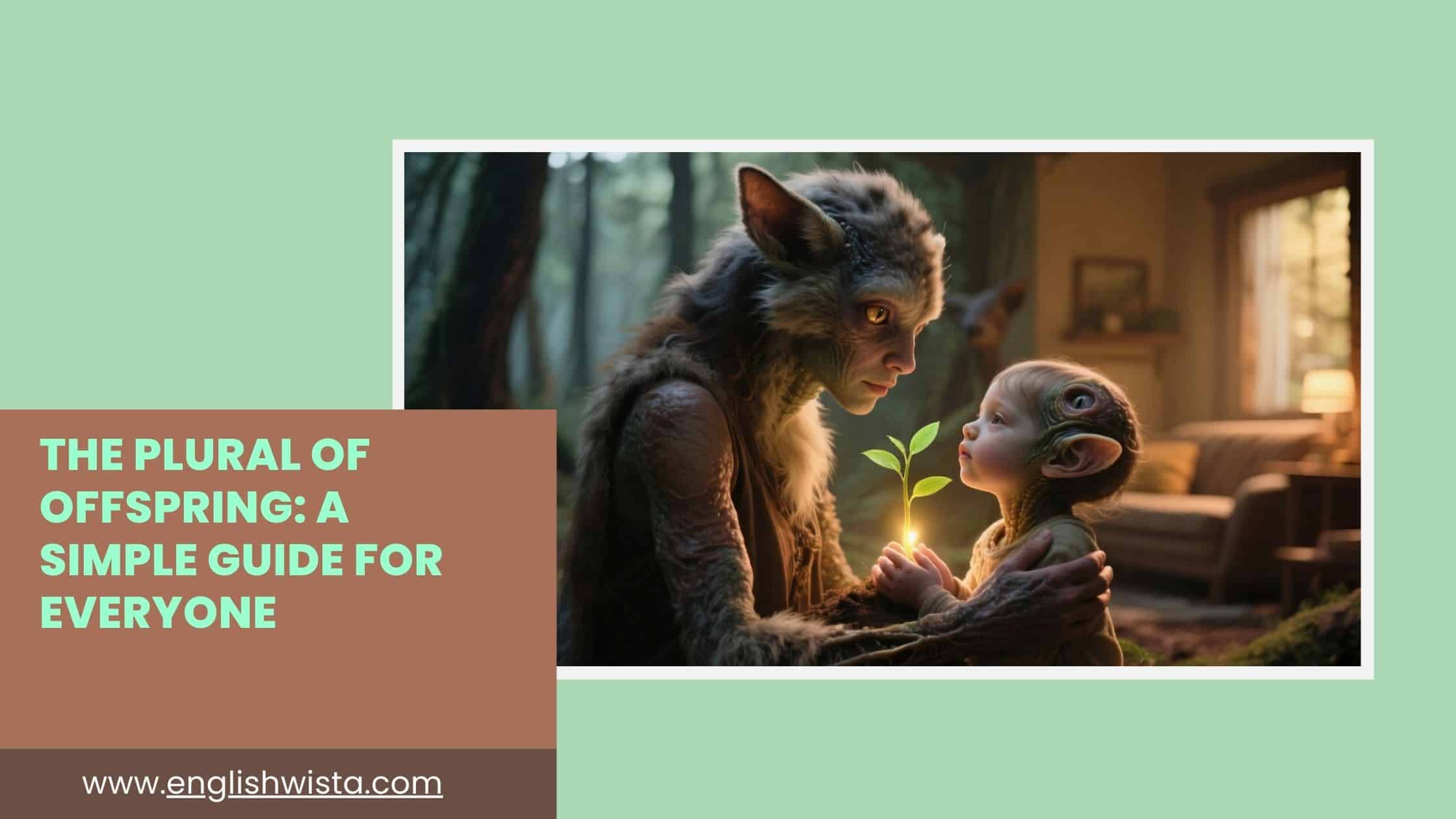Have you ever come across the word offspring and wondered, “Wait, what’s the plural of this?” If so, you’re not alone! English can be a tricky language when it comes to plurals. Most words follow simple rules: add an s or es and you’re done. Dog becomes dogs, bus becomes buses. Easy, right? But then words like offspring come along and break the pattern.
Don’t worry. In this article, we’re going to unpack everything about the plural of offspring in a fun, clear, and beginner-friendly way. By the end, you’ll know exactly how to use it correctly, and you’ll even pick up some fun facts along the way. So, let’s dive in!
What Does “Offspring” Mean?
Before we talk about plurals, let’s start with the word itself.
Definition:
The word offspring simply means a child or children, or the young of an animal. It refers to the next generation, the product of reproduction.
For example:
- A baby is the offspring of its parents.
- Puppies are the offspring of a dog.
So whenever you see offspring, think of it as talking about the young ones of people, animals, or even plants sometimes.
What Is the Plural of Offspring?
Here comes the main question. The answer might surprise you.
The plural of offspring is… offspring.
Yes, you read that right! The word doesn’t change whether you’re talking about one child or many children. It stays the same.
For example:
- Singular: “The lion protected its offspring.” (one cub)
- Plural: “The lion protected its offspring.” (several cubs)
In both cases, the word is identical. Context is what helps you understand if it’s singular or plural.
Why Doesn’t It Change?
English has a funny mix of rules, especially with words that come from Old English or other languages.
The word offspring is one of those words that doesn’t add -s in the plural form. Instead, it stays the same for both singular and plural.
Other words like this include:
- Sheep → sheep
- Deer → deer
- Fish → fish (sometimes fishes, but usually just fish)
So, offspring belongs to this “unchanging plural” group.
Is Offspring Singular or Plural?
This is a common question, and it’s a good one. The answer is: offspring can be both singular and plural, depending on the situation.
Let’s look at both cases:
- Singular:
- “The bird cared for its only offspring.” (just one chick)
- Plural:
- “The farmer’s cow had three offspring.” (three calves)
So, you’ll have to rely on the context of the sentence to know which meaning is intended.
How to Use Offspring in Sentences
Let’s practice with a few examples. This way, it’ll stick in your mind more clearly.
- “Parents always want the best for their offspring.” (plural)
- “That panda is nursing her offspring.” (singular)
- “The scientist studied the offspring of the laboratory mice.” (plural)
- “Every tree produces offspring in the form of seeds.” (plural)
- “She was proud of her talented offspring.” (could be singular or plural, depending on context)
Notice how in every sentence the word offspring looks exactly the same. Only the surrounding words give you clues.
Can We Say “Offsprings”?
This is where many learners get confused. Technically, offsprings is not considered standard English. Most dictionaries will mark it as incorrect or very rare.
You might see offsprings in old books or informal writing, but it’s best to stick with just offspring—both for singular and plural. That’s the accepted and widely used form.
So remember:
- Correct: offspring
- Not correct (in modern English): offsprings
The Origin of the Word Offspring
Words become even more interesting when you know where they come from.
The word offspring comes from Old English. It’s made of two parts:
- off (meaning “away” or “from”)
- spring (meaning “to rise” or “to come forth”)
So together, it literally meant something like “that which springs forth from.” That makes perfect sense when we think of children or young ones!
Comparing Offspring with Other Words
Sometimes it helps to compare. Let’s look at how offspring behaves compared to similar words.
- Child → Children (changes completely)
- Baby → Babies (adds -ies)
- Kitten → Kittens (adds -s)
- Offspring → Offspring (stays the same)
This shows that English doesn’t always follow one rule. That’s why it’s important to learn exceptions like offspring.
Tips to Remember the Plural of Offspring
Here are some quick tricks to keep it simple:
- Think of sheep and deer. If those words don’t change in the plural, neither does offspring.
- Context is king. Pay attention to the words around offspring to know if it’s singular or plural.
- Never add -s. If you’re tempted to write offsprings, stop yourself. Just write offspring.
Fun Facts About Offspring
Let’s add a little extra spice with some fun tidbits:
- The word offspring can be used for humans, animals, and even plants. Seeds are often called the offspring of plants.
- In science, especially in biology and genetics, offspring is a very common term. Scientists often study how traits pass from parents to offspring.
- The word can also be used in a figurative sense. For example, you could say, “The new invention is the offspring of creative thinking.” Here, it doesn’t mean a child but a product or result.
Common Mistakes to Avoid
When learning, it’s normal to make mistakes. Here are the most common ones with offspring:
- Saying offsprings instead of offspring.
- Forgetting that it can be both singular and plural.
- Assuming it only applies to people. Remember, it can describe animals and plants too.
Quick Recap
Let’s summarize what we’ve learned in simple points:
- Offspring means a child, children, or young ones of an animal or plant.
- The plural of offspring is offspring (no change).
- It can be both singular and plural depending on context.
- Offsprings is not correct in modern English.
- The word comes from Old English, meaning “that which springs forth.”
Conclusion
So there you have it! The word offspring is one of those special English words that doesn’t change in the plural. At first, it might feel strange, but once you practice with examples, it becomes easy to remember.
Whenever you see or use it, just think: whether it’s one child or ten, the word stays the same. That’s part of what makes English both challenging and fun.
Next time someone asks, “What’s the plural of offspring?” you’ll know the answer with confidence—and you can even share a few fun facts about its history.
Language is full of surprises, and learning them one by one makes you a stronger and more confident speaker. Keep exploring, keep practicing, and enjoy the journey!



